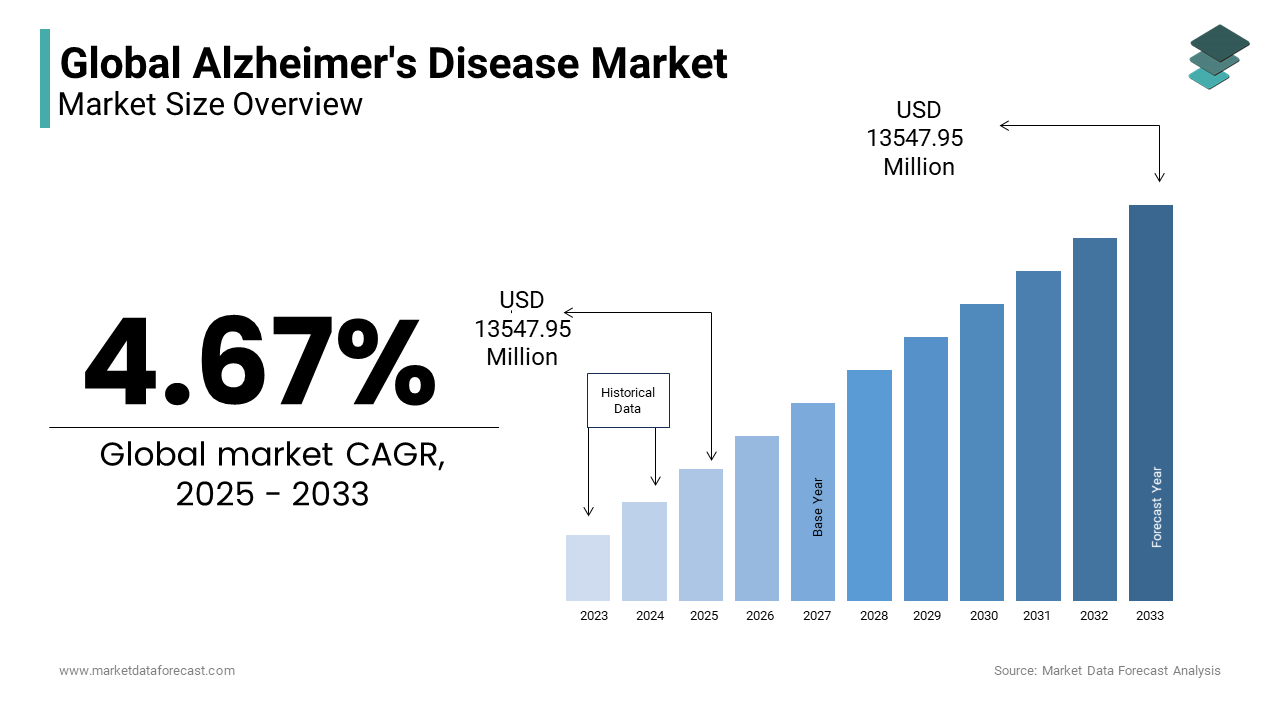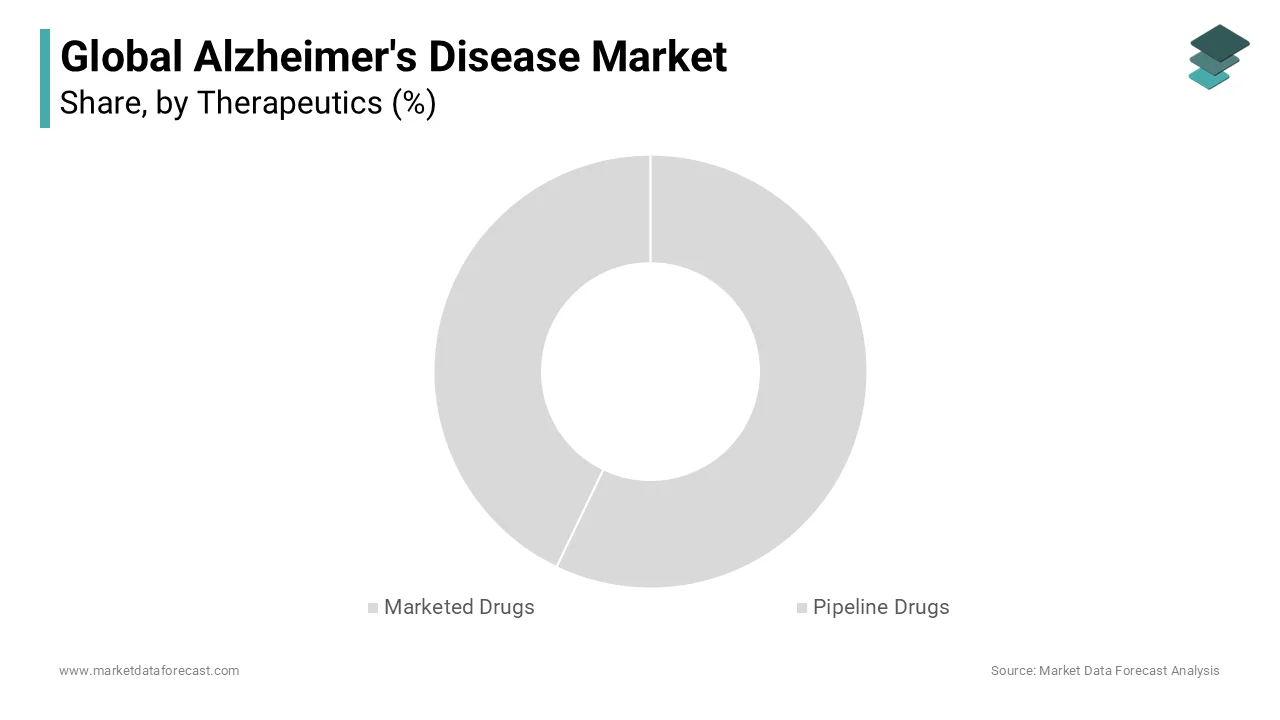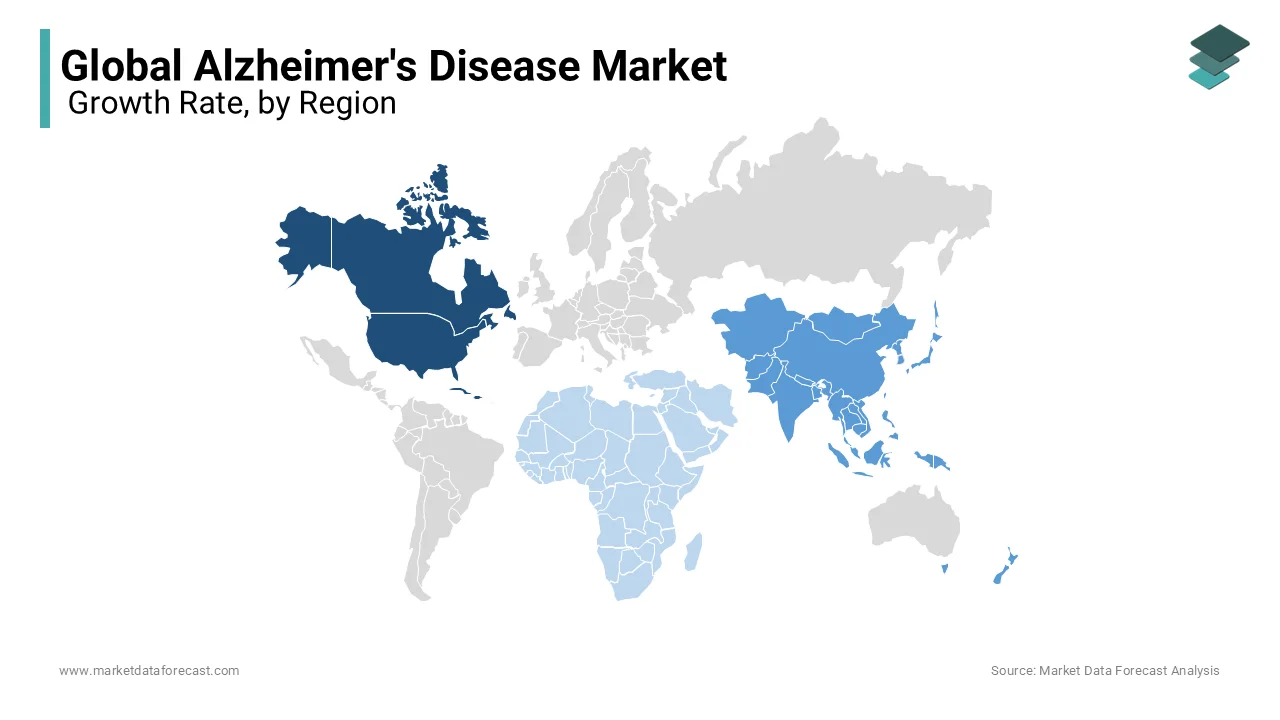Global Alzheimers Disease Market Size, Share, Trends & Growth Analysis Report - Segmented By Therapeutics (Marketed Drugs and Pipeline Drugs) Diagnostics (CT Scan, Electroencephalography, Lumbar Puncture Test, MRI, Positron Emission Tomography and Others) and Region – Industry Forecast from (2025 to 2033)
Global Alzheimer's Disease Market Size
In 2024,the global Alzheimer's disease market was valued at USD 12943.49 million and it is expected to reach USD 19518.72 million by 2033 from USD 13547.95 million in 2025, growing at a CAGR of 4.67 % during the forecast period.

Alzheimer's disease (AD) is the most natural cause of progressive dementia in the elderly. There has been an exponential increase in the frequency of Alzheimer's disease cases globally, stressing the need to develop an effective treatment to cure it. Alzheimer's is a neurological disease affecting an individual's memory, thinking, and behavior. The traits usually worsen over time to the extent of the inability to perform daily tasks. Alzheimer's disease (AD) is one of the most widespread dementias in the world. According to the facts and figures of the Alzheimer's Association, every 33 seconds, a new case of Alzheimer's disease occurs. At a very high stage, millions of patients are suffering. Eventually, the improvement in technology regarding AD and neurodegenerative conditions is becoming significant. Unfortunately, 10-20% of AD diagnoses are inaccurate. To overcome this hurdle. Alzheimer's disease is a degenerative and progressive disease that attacks the nerve cells, which results in the loss of memory, behavioral changes, and changes in thinking and language skills. There is fast growth in the number of people living with Alzheimer's disease, with around one individual in four diagnosed with this disease.
MARKET DRIVERS
The growing number of patients with Alzheimer's and neurodegenerative diseases, the increasing aging population, growing investments for R&D, and improved life expectancy of the general population are propelling the Alzheimer's disease market.
In addition, the YOY rise in the geriatric population and the growing prevalence of chronic diseases such as dementia are promoting the growth rate of the Alzheimer's disease market. Furthermore, increasing the channels for drug development and investing in biomarkers also fuel the growth rate of the Alzheimer's disease market. In addition, growing innovative diagnostics for early diagnosis, more specific drug development, and increased life expectancy in the general population drive the global Alzheimer's disease market. According to the United Nations's Global Population Prospects 2019, by 2050, one in every six inhabitants will be over 65, up from one in every eleven in 2019. Furthermore, the market is expected to expand due to increased clinical studies on diagnosing and treating Alzheimer's.
The other factors anticipated to promote the growth of the Alzheimer's disease market are the increasing occurrence of chronic diseases like dementia, increasing channel drug development, venture into biomarkers for drug development, and increasing advanced diagnostics for early detection and more specific drug development. In addition, very few therapeutic options are on the market, and none offer a complete remedy for this condition. Hence, entry into the market would provide lucrative growth prospects to the market participants.
MARKET RESTRAINTS
However, a shortage of surrogate indicators for drug discovery and production, inadequate testing resources, and long, unpredictable procedures are expected to hamper the growth rate of the global Alzheimer's disease market. With the rising number of people impacted, Alzheimer's disease is becoming a significant public health issue. Alzheimer's disease affects 5.3 million Americans and 35 million individuals globally. New treatments for diagnosing and treating Alzheimer's disease are desperately needed as the disease progresses worldwide. However, since the signs are mild and the anatomical changes in the brain and central nervous symptoms are not often evident by medical scans, early diagnosis of Alzheimer's disease (AD) is complex, and the early symptoms of Alzheimer's disease (AD) are often ignored. This restriction has severe consequences because late-stage diagnosis provides patients only symptomatic relief alternatives through drugs, reducing the potential advantage that may have been achieved through early medication and diagnosis. As a result, shortcomings in early-stage AD diagnosis restrict the global development of the Alzheimer's disease market.
REPORT COVERAGE
|
REPORT METRIC |
DETAILS |
|
Market Size Available |
2024 to 2033 |
|
Base Year |
2024 |
|
Forecast Period |
2025 to 2033 |
|
CAGR |
4.67 % |
|
Segments Analysed |
By Therapeutics, Diagnostics, and Region |
|
Various Analyses Covered |
Global, Regional & Country Level Analysis, Segment-Level Analysis, Drivers, Restraints, Opportunities, Challenges; PESTLE Analysis; Porter's Five Forces Analysis, Competitive Landscape, Analyst Overview of Investment Opportunities |
|
Regions Analysed |
North America, Europe, Asia Pacific, Latin America, the Middle East, and Africa |
|
Market Leader Profiled |
Pfizer Inc., AC Immune SA, Eisai Co Ltd., Allergan PLC, Novartis AG, Amarantus Bioscience Holdings |
SEGMENTAL ANALYSIS
By Therapeutics Insights
Due to a large user base, the marketed drugs segment is predicted to lead the global market based on therapeutics during the forecast period. Additionally, Cholinesterase inhibitors have the largest market share and are expected to witness a CAGR of 6.8% during the forecast period. Cholinesterase inhibitors have higher efficiency in the treatment of Alzheimer's. These drugs help promote communication between nerve cells with higher concentrations of acetylcholine, which temporarily stabilizes symptoms of dementia. Donepezil is the most widely prescribed cholinesterase inhibitor, which has been approved to treat all stages of Alzheimer's disease. Most physicians and patients consider cholinergic drugs useful as the US FDA approves them. In addition, several clinical trials are ongoing on cholinesterase inhibitors to increase drug efficacy and decrease adverse effects. Therefore, the cholinesterase inhibitor drug market will grow during the forecast period due to recent developments.

NMDA Receptor Antagonists are another class of drugs anticipated to grow profitably under this segment. N-methyl-D-aspartate receptor antagonists effectively help the patient with Alzheimer's disease because of which the patient suffers from brain damage, memory loss, and possibly death. They help with the strong depolarization of the postsynaptic membrane to attenuate channel blockade by Mg2+, activating the drug action. In addition, the wide range of availability of drugs such as dextromethorphan, opioids methadone, ketobemidone, ketamine, memantine, dextropropoxyphene, and amantadine is further driving the growth of the segment.
By Diagnostics Insights
Among all the segments, the CT scan segment is estimated to dominate the global Alzheimer's disease market during the forecast period. The absence of an alternative imaging tool for brain and neurological diagnostics is crucial for its large share. Being the most common type of brain scan, computed tomography is used in the diagnosis of dementia and dementia-like symptoms, which helps in ruling out other conditions that cause changes in brain structure because of Alzheimer's disease. This system of brain imaging help in diagnosis that explains dementia by allowing doctors to see changes in brain structure and its functioning. Brain loss associated with Alzheimer's disease and the formation of abnormal levels of amyloid plaques in the affected Region of the brain is detected using computed tomography. Thus, it helps in the growth of the segment.
The MRI segment is expected to hold a significant share of the global market during the forecast period owing to the ability of an MRI machine to reveal the parts of the brain getting smaller and the effect of different diseases on the brain. In addition, it helps researchers to find out the consequences of dementia, its different types, and the results of treatments, revealing the way patients respond.
Positron emission tomography, or a PET scan, is predicted to grow at a healthy CAGR over the forecast period, being a painless and non-invasive procedure that measures the build-up of one of the hallmarks of Alzheimer's disease, abnormal amyloid proteins in the brain. It removes the extra procedures and reduces the number of scanning sessions a patient needs to complete, taking only about 30 minutes. Further, it provides better imaging data, which increases patient comfort. Such factors are foreseen to drive the growth of the global Alzheimer's disease market under this segment over the forecast period.
REGIONAL ANALYSIS
Geographically, the North American Alzheimer's disease market currently commands a significant share of the global market. It is expected to sustain its stronghold in the future, owing to the growing prevalence of Alzheimer's disease and extensive technological developments in the Region. The United States holds the largest share of the global Alzheimer's disease market. The United States is the worldwide leader in Alzheimer's disease intervention and management. Numerous biopharmaceutical companies operate in America cumulatively, with 85 drugs for combating Alzheimer's disease in various pipeline stages. Hence, the market is expected to register a healthy CAGR over the forecast period.

With the growing aging population in developing regions of Asia Pacific, the APAC Alzheimer's disease market is expected to grow at the highest CAGR during the forecast period. Developing countries are expected to offer promising opportunities for this market. According to Alzheimer's Disease International in 2015, 58% of dementia patients lived in developing countries, but by 2050 this will soar to 68%. The fastest aging population growth occurs in China, India, and their South Asian and Western Pacific region. According to the World Alzheimer Report in 2015, regional estimations of dementia prevalence in people aged 60 years and over vary from 4.6% in Central Europe to 8.7% in North Africa and the Middle East. However, all other regional estimates fall between 5.6% and 7.6%.
The Europe Alzheimer's disease market captured a substantial share of the worldwide market in 2023.
The Alzheimer's disease market in Latin America is predicted to showcase a healthy CAGR during the forecast period.
Alzheimer's disease market in the Middle East and Africa held a moderate share of the worldwide market in 2023.
KEY MARKET PLAYERS
Some of the dominating companies in the Global Alzheimer's Disease Therapeutics and Diagnostics Market analyzed in this report are Abbvie Inc., Pfizer Inc., AC Immune SA, Eisai Co Ltd., Allergan PLC, Novartis AG, Amarantus Bioscience Holdings, H. Lundbeck A/S, Anavex LifeSciences, Avid Radiopharmaceuticals, Forest Laboratories Inc., Axon Neuroscience, Daiichi Sankyo Co, TauRx Therapeutics Ltd, Eli Lilly, F. Hoffmann La Roche AG, Johnson & Johnson, GE Healthcare and Janssen Pharmaceuticals.
RECENT HAPPENINGS IN THE MARKET
-
In Dec 2023, Cognition Therapeutics became the first participant to receive a dose in Europe after the Phase 2 SHINE clinical trial of Oral CT1812 in Alzheimer's disease patients. This led to its expansion in clinical sites in the Netherlands, Spain, and the Czech Republic. This once-daily oral capsule has been developed for treating mild to moderate Alzheimer's disease by modulating a critical cellular receptor, sigma-2, to block the binding of oligomers to neurons. This new mechanism of action results in the prevention of their synaptotoxic effects.
-
In November 2023, the successful results of Eisai's significant global confirmation Phase 3 Clarity AD clinical study of lecanemab were announced by Eisai Co., Ltd., and Biogen Inc., which was used for the treatment of cognitive impairment in Alzheimer's disease. In addition, this investigational anti-amyloid beta protofibril antibody for severe and mild Alzheimer's disease with amyloid pathology in the brain has been showcased at the Clinical Trials in Alzheimer's disease conference in San Francisco.
- In November 2023, Eli Lilly and Company shared positive donanemab data, which met all primary and secondary endpoints during the first active comparison study in early symptomatic Alzheimer's disease for the 6-month primary outcome analysis in the Phase 3 TRAILBLAZER-ALZ 4 study. The FDA's accelerated approval pathway provided the first active comparison data on amyloid plaque clearance to patients with early symptomatic Alzheimer's disease. The beta-amyloid plaque reduction biomarker recognized by FDA has treated patients with amyloid-targeting therapies with a reasonable likelihood of predicting clinical benefit. This helps in treating early-onset Alzheimer's disease, preventing its further stages, and assessing superiority in reducing amyloid plaque.
- In a recent study in Dec 2023, hundreds of participants were recruited by researchers in China to study biomarkers of Alzheimer's disease with healthy cognition or dementia for its early detection by focusing on urinary formic acid. With the hope of finding affordable and accessible early detection tests for Alzheimer's disease, scientists have checked the participants' formic acid levels since its higher levels in urine may indicate cognitive impairment, per the researcher's findings.
MARKET SEGMENTATION
This research report on the global Alzheimer's disease Market is segmented and sub-segmented based on Therapeutics, diagnostics, and region.
By Therapeutics
- Marketed Drugs
- NMDA Receptor Antagonists
- Cholinesterase Inhibitors
- Pipeline Drugs
By Diagnostics
- CT Scan
- Electroencephalography
- Lumbar Puncture Test
- MRI
- Positron Emission Tomography
- Others
By Region
- North America
- Europe
- Asia Pacific
- Latin America
- Middle East and Africa
Frequently Asked Questions
How big is the Alzheimer's disease market?
By 2033, the global Alzheimer's disease market size is expected to value at USD 19518.72 million.
Which region is dominating the Alzheimer's disease market?
In 2024, the North American region was the leader in the global Alzheimer's disease market.
Who are the major players in the Alzheimer's disease market?
Abbvie Inc., Pfizer Inc., AC Immune SA, Eisai Co Ltd., Allergan PLC, Novartis AG, Amarantus Bioscience Holdings, H. Lundbeck A/S, Anavex LifeSciences, Avid Radiopharmaceuticals, Forest Laboratories .
Related Reports
Access the study in MULTIPLE FORMATS
Purchase options starting from
$ 2500
Didn’t find what you’re looking for?
TALK TO OUR ANALYST TEAM
Need something within your budget?
NO WORRIES! WE GOT YOU COVERED!
Call us on: +1 888 702 9696 (U.S Toll Free)
Write to us: sales@marketdataforecast.com
